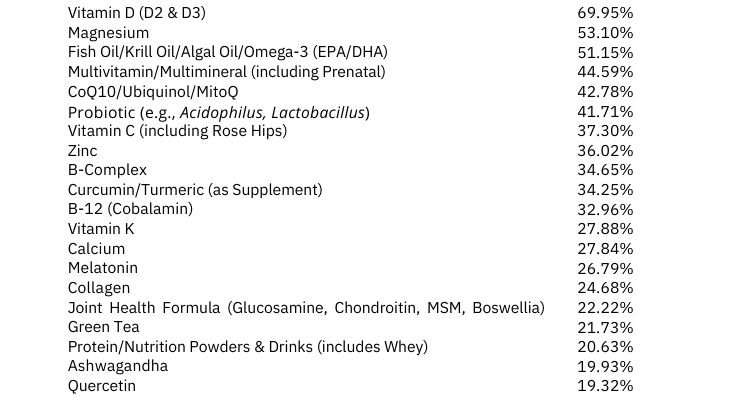A survey of 8,600 people who regularly use dietary supplements showed that probiotics (+3.04 percentage points), quercetin (+2.3 pts), and vitamin K (+1.96 pts) experienced the greatest absolute growth in popularity over the past year.
Meanwhile, the greatest declines were with vitamin C (-4.56 pts), calcium (-3.05 pts), melatonin (-2.66 pts), vitamin D (-2.62 pts), and green tea (-2.21 pts).
These results came from ConsumerLab’s most recent Survey of Vitamin and Supplement Users, which is conducted each year in November/December among readers of the company’s newsletter. ConsumerLab.com is a popular source of product reviews and information people use when choosing and using supplements and health foods.
The ConsumerLab.com Survey was first conducted in 2002. Respondents are active users of supplements, with over 81.5% taking at least four different supplements daily.
“The annual survey is a useful indicator of change in the market for dietary supplements and health foods. It guides our selection of products to test,” said Tod Cooperman, MD, ConsumerLab’s president and founder.
Popularity Contest
The survey assessed the popularity of 209 types of supplements—including supplements for pets—and analyzed popularity by respondent age, gender, and frequency of supplement use.
Vitamin D remained the most popular supplement overall, purchased by about 70% of respondents. Magnesium (+1.34 pts) remained the second most popular supplement, used by 53.1% of respondents, just ahead of fish oil (+0.69 pt).
Multivitamins (+1.28 pts) moved up to 4th place, as CoQ10 (-2.19) moved down to 5th place. Probiotics moved up to 6th place, as vitamin C slid to 7th place, followed by zinc (+0.87 pt). B-complexes (+1.69 pts) moved up two spots to 9th place, followed by curcumin/turmeric (-1.6 pts).
Among the current top 50 supplements, 21 declined in popularity while 20 showed an increase.
20 Most Popular Vitamins and Supplements At the End of 2022 (% Survey Respondents Purchasing in Past Year)




